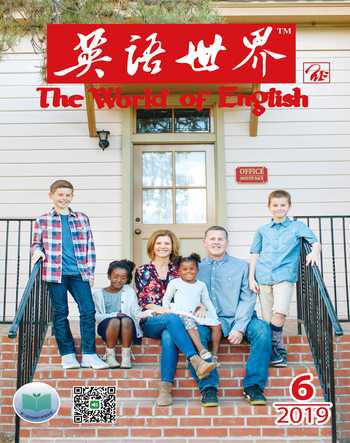Family and Identity家庭与身份认同
凯特·塔特尔 玛丽亚·卡里姆吉 刘丽丽
Whenever Nicole Chung, as a child, asked her mother about her birth parents, she always heard the same answer: they “had just moved here from Korea” and “thought they wouldn’t be able to give you the life you deserved.” This brief story, one of love and sadness and altruism, “may be all you can ever know,” her mother told her. “All You Can Ever Know” is now the title of Chung’s memoir. The phrase has a double meaning. It hints at the vastness of what can be gleaned1—true or false—from an origin story, even as it evokes a sense of permanent loss and incompletion.
Growing up with her adoptive white parents in a very white town in southern Oregon, Nicole Chung “kept a secret running tally of every single Asian person I had ever seen in public.” There were so few, and her isolation so internalized2, that even as a bookish little girl the stories she wrote didn’t include Asian characters. “Even when I was at my freest and most imaginative, peering beyond the limits of my own lived reality, I couldn’t picture someone like me at the center of the story,” Chung writes. “To be a hero, I thought, you have to be beautiful and adored. To be beautiful and adored, you had to be white.”
Her stunning debut memoir confronts enormous pain with precision, clarity, and grace. Chung was born in Seattle in 1981, two months premature, with an uncertain prognosis. Her birth parents were Korean immigrants already raising two girls, struggling both financially and in their marriage. Her adoptive parents saw her as a gift from God, the happy answer to the difficult questions posed by their infertility. Her adoption became a family story in which the right thing had happened; Nicole’s identity as a person of color in an all-white setting was an unimportant detail; and God had worked in mysterious ways. “The story, a lifeline3 cast when I was too young for deeper questions, continued to bring me comfort,” Chung writes.
As she grew, so did the questions. Chung first heard slurs in early grade school, the white boys who would pull the corners of their eyelids to mock her appearance, the white girls who asked demeaning4 questions. Her parents advised her to ignore the bullies, downplaying both the cruelty with which classmates mocked her for being adopted and the wounding force of the racism hurled at her.
“I never had a name for what was happening,” Chung notes. “My parents and I had certainly never discussed the possibility that I might encounter bigots5 within my school, our neighborhood, our family.” Their inability or unwillingness to talk about race and racism was and remains common among white parents, even the most well-meaning, but it left Chung disconnected from her own identity.
It wasn’t until she graduated from college that Chung began to understand her own experience as part of a larger story. “After a lifetime of feeling isolated by my adoption,” she writes, “I began to think of myself as part of a broader culture of people affected by it.” Understanding that narrative—and the complex issues of race and identity that were so little explored in her own childhood—gained urgency as Chung prepared to become a mother herself. She writes with an almost prescient6 wisdom that “no matter how a child joins your family, their presence changes all the rules; they move into your heart and build new rooms, knock down walls you never knew existed.”
After a protracted and unglamorous process of filing paperwork and wrangling7 lawyers, she’s alarmed to uncover the reality of the Chungs, her biological family. She has an older sister, Cindy, who was physically abused by their birth mother; their parents are divorced and not speaking; her birth father told Cindy that Nicole was dead. Previously, when thinking about her long-lost kin, Chung had pictured currents of strength flowing toward her: “a web of connections too delicate to be seen or touched, too strong to be completely severed.” With more information, the mystery of what travels along those hidden paths seems less benign. Mrs. Chung’s violent nature suggests, to Nicole, “an invisible thread connecting all my anxieties, my many shortcomings, all my worst moments.”
Chung’s reunion with her sister Cindy is told in expansive, detailed scenes that bring Chung’s adult emotions to life in sharp focus8: “Fat raindrops dotted my red sweater, mingled with9 the moisture on my face,” Chung writes about that moment. Her evolving relationship with her sister gives the book an additional emotional heart.
Though the story is intensely personal, it’s never myopic10 and, ultimately, it’s universal: a story about learning to grapple with11 our own identities, about learning where we belong, and about families.
小時候,每次问妈妈有关自己亲生父母的事情,妮科尔·郑得到同样的回答:他们“那时候刚刚从韩国移民过来”;他们“认为无法给你应有的生活”。这个集爱、悲伤与无私的简要故事,“大概是你所能知道的一切”了,妈妈这样告诉她。“你所能知道的一切”现在成了妮科尔·郑自传的书名。这个短语包含两层意思:它一方面暗示,我们能从这个溯本求源的故事中收获无尽的信息——无论真假;另一方面,它让人产生一种永久失去与不完整的感觉。
妮科尔·郑由白人养父母抚养长大,生活在俄勒冈州南部一个白人小镇上,“总是偷偷留意在公众场所碰到过的每一个亚洲面孔”。可是那里的亚洲人实在太少,孤立感隐藏在她内心深处,即便小时候爱读书的她写的故事里也没有亚洲人的角色。“甚至在我最随意、想象力最丰富的时候,审视自己生存现实的局限,我也无法想象将像我一样的亚洲人置于故事中心会是什么样子。”郑写道,“我一直觉得,主人公一定要既漂亮又可爱,而这样的人物非白人莫属。”
这是妮科尔·郑令人印象深刻的首部回忆录,直面巨大的伤痛,表达准确、清晰而优美。郑1981年出生于西雅图,带着“预后难定”的诊断结果早产了两个月。她的亲生父母是来自韩国的移民,当时带着两个女儿的他们生活拮据,又面临婚姻危机。在养父母心中,她是一份来自上帝的礼物,他们因不孕不育而面临的各种难题由此得到圆满的解决。领养她是家族故事中一个无比正确的决定;白人环境中妮科尔的黄皮肤是一个无关紧要的细节;这是上帝的神来之笔。“我儿时还参不透深奥问题,这个故事便是我的救命稻草,一直带给我安慰。”郑写道。
随着郑慢慢长大,她心头的问题也越来越多。第一次被恶语中伤是在小学低年级的时候,那些白人男孩用手拉长眼角,以此取笑她的亚洲人面孔,白人女孩则问她一些伤自尊的问题。养父母叫她不要理会那些,至于同班同学对她领养身份的无情嘲弄以及种族歧视带给她的伤害,他们也叫她不要放在心上。
“对那时发生的事,我不知怎么描述。”郑写道,“关于我在学校、社区甚至家族中可能会遭遇偏见,爸爸妈妈从来没跟我讨论过。”不过在当时,白人父母无法或者不愿談论种族和种族歧视的情况非常普遍,虽是出于最大的善意,却使郑迷失在自己的身份认同问题上。
直到大学毕业,郑才开始意识到,她的个人经历只不过是宏大背景下的一个小故事。“因为领养身份而一生感到孤立,”她写道,“至此我才开始明白,除了自己之外,还有很多不同文化背景的人有着相同的经历。”理解这种经历,懂得她童年时期几乎未曾探究过的复杂的种族和身份认同问题,对准备做母亲的郑来说显得尤为紧要。她的笔触饱含预知的智慧:“一个孩子无论以何种方式成为你家庭的一员,他们的存在都会让你的生活发生天翻地覆的变化;他们会住进你的心里,在那里开疆拓土,将你之前根本没有意识到的内心隔阂一一破除。”
经过旷日持久、单调乏味的申请程序和司法辩论之后,她终于忐忑不安地获悉了郑家的现状,找到了她的亲生家人。她有一个姐姐,叫辛迪,小时候经常遭受母亲的打骂;她们的父母早已离婚,不再联系;她的生父曾告诉辛迪,妮科尔已经不在人世。在这之前,每次一想到自己失散已久的家人,妮科尔总会感觉有一股股力量向她涌过来:“一张亲情的网,那么脆弱,看不见,也摸不着;却又是那么强韧,无法完全切断。”随着更多信息浮出水面,隐藏的神秘过往似乎不那么无害了。在妮科尔看来,郑太太的暴力倾向“像一根无形的线,将我心中所有的焦虑、我很多的缺点以及我所有最糟糕的经历串联起来。”
与姐姐辛迪的会面,妮科尔在书中作了详尽而细致的描述,清晰而生动地刻画了自己成年人的情感:“豆大的雨滴打湿了我红色的毛衣,与我脸上流淌的泪水混为一体。”郑这样写道。她与姐姐相认的故事让本书的情感更加丰富。
尽管这个故事讲述的是个人经历,但其意义绝不肤浅,最重要的是,它包含了普世价值:这是一个关于处理自我身份认同问题、找到归属、探寻家庭意义的故事。
(译者为“《英语世界》杯”翻译大赛获奖选手)

